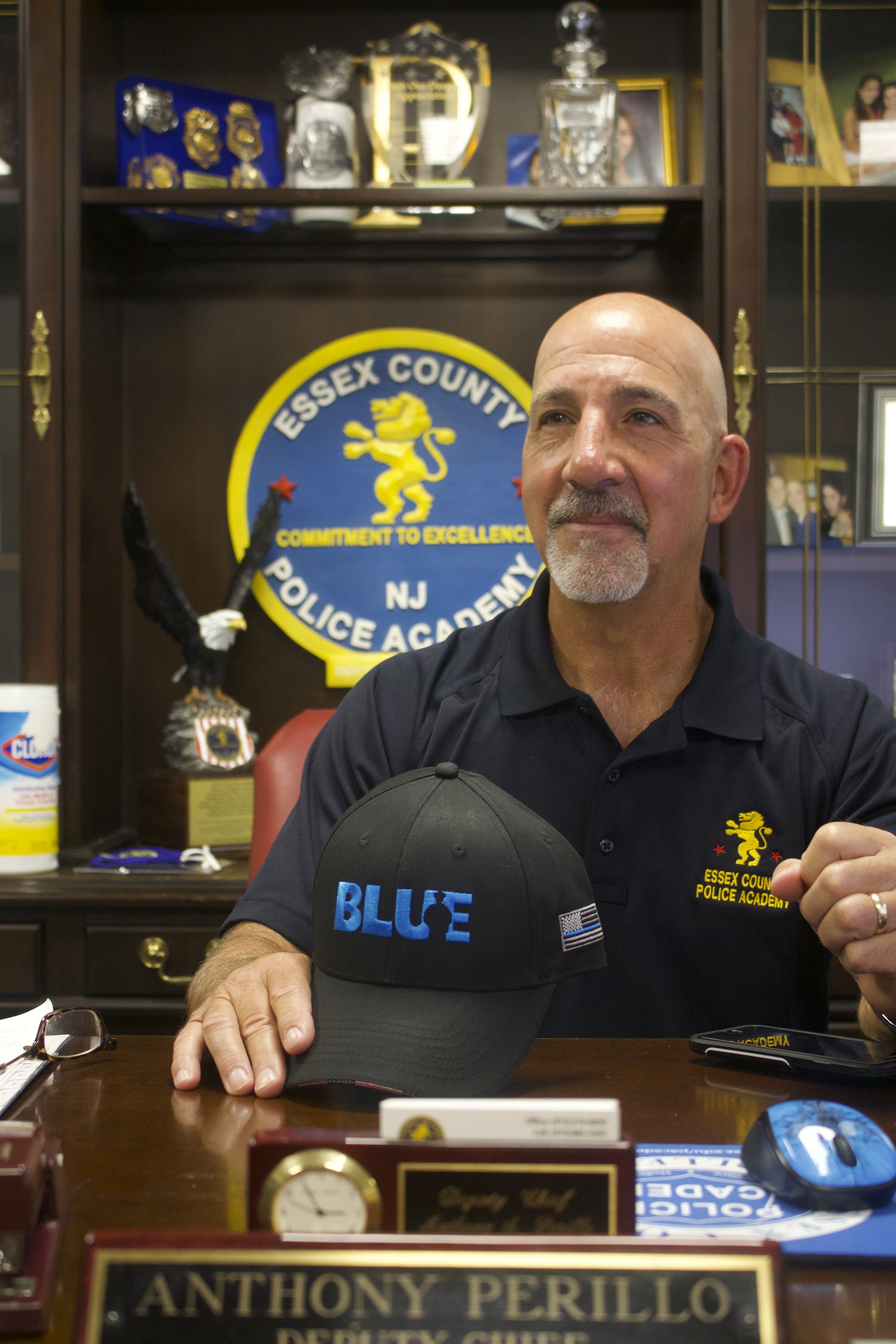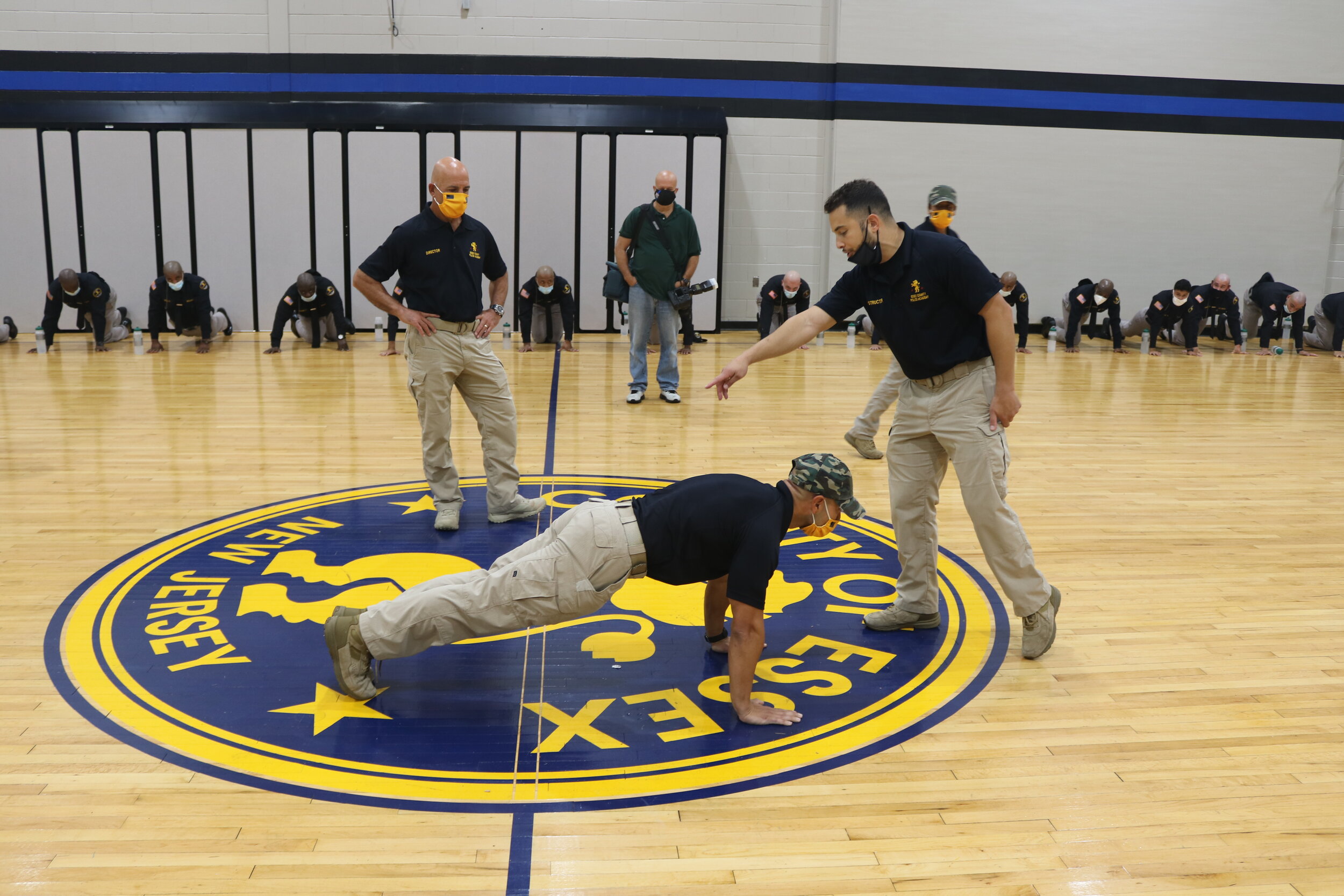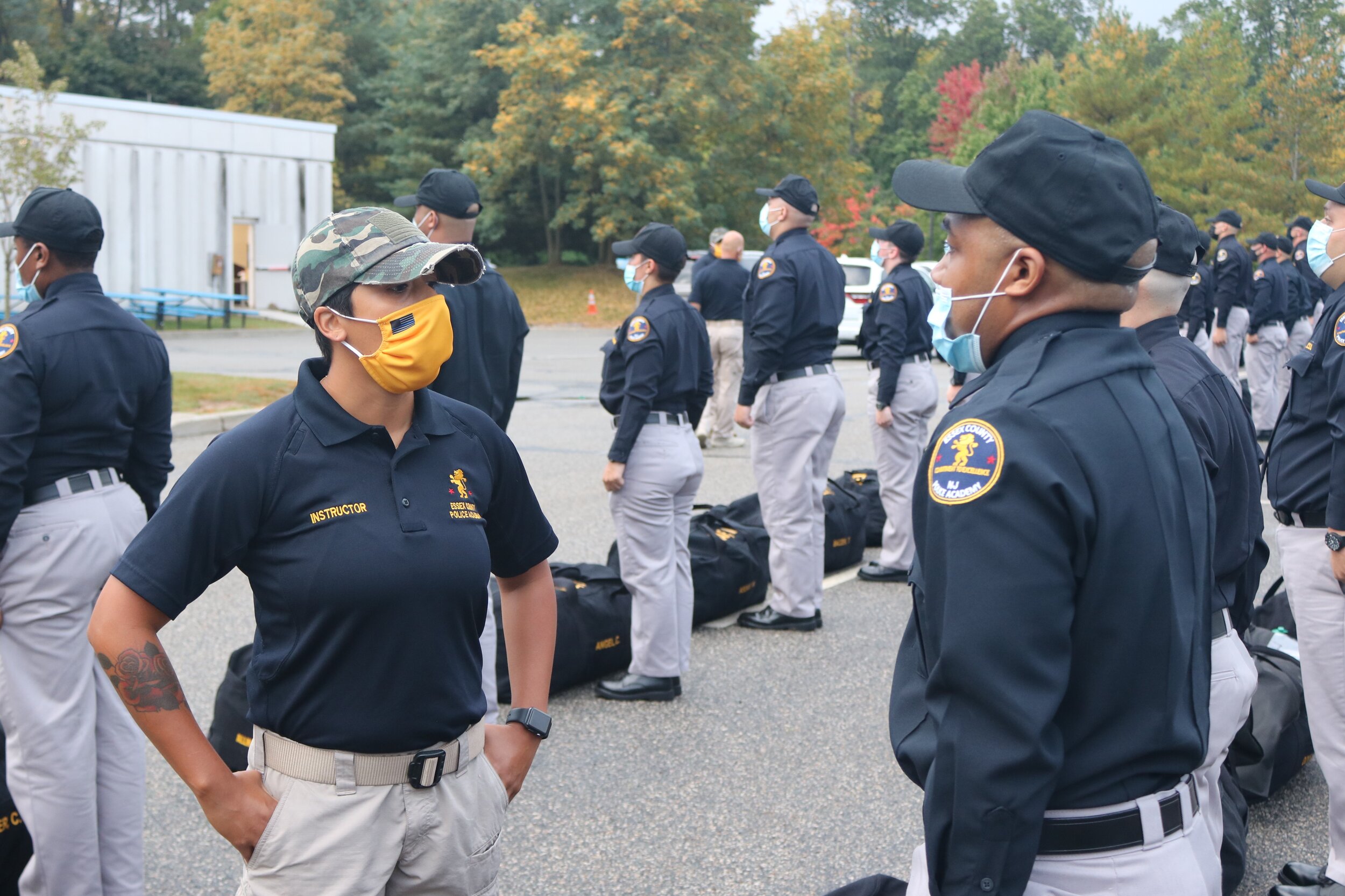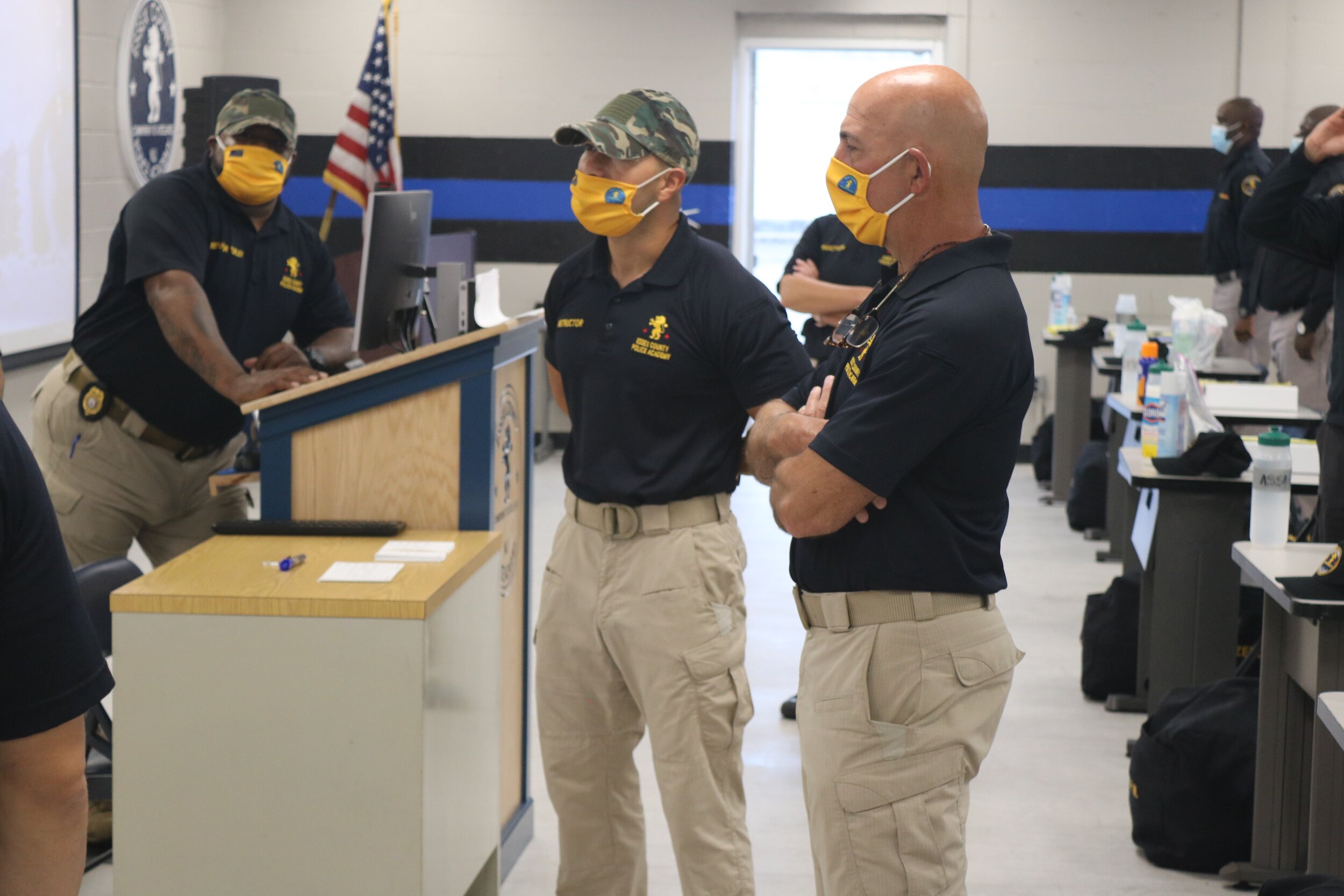Exclusive Interview with Essex County New Jersey Police Academy Director Anthony Perillo
/By The Blue Magazine
Blue Magazine recently sat down with Essex County Police Academy Director Anthony Perillo to discuss many important issues regarding the training of recruits during the pandemic, and many other important issues effecting law enforcement. Blue Magazine thanks Director Perillo and wishes the recruits successful and safe careers.
The Blue Magazine: Director Perillo, how long have you been the director of this academy?
Director Anthony Perillo: Since January of 2019.
What were you doing before this position?
I started my law enforcement career in February of 1981 with the Essex County Police Department. I was hired by the Newark Police Department in July of 1985 and spent 27 years, retiring as a deputy chief in 2011. Once returned, I was hired by the County of Essex as an administrator with at the Essex County Department of Corrections, where I served as the Director of the Immigration Detention Program.
What's the experience with the current recruits because of COVID?
The current recruit class is monitored very closely for COVID, with temperatures and COVID related symptoms checked on a daily basis. Recruits that have COVID symptoms are sent home and are required to be tested prior to their return. In the event of positive testing, recruits are required to quarantine for a 14 day period. All classroom seats are situated 6 feet apart. Which has drastically impacted the number of recruits in the class. The class is told, listen, I don't like recruits not coming to class, but if you feel sick, we don't want to take any chances. We do our best to keep everyone safe.
Prior to this class at the onset of COVID, the NJ police training commission approved our SLEO II class that was in session to be trained virtually for the lecture portion of the instruction. Recruits logged onto our website and were provided instruction virtually. We couldn't successfully do an entire class like that, so we had to eventually get them back in.
Recruits were then brought back, after being tested for COVID, firearms, defensive tactics, building searches, vehicle pullovers, and hands on training of that nature. We trained outdoors and that was important. Social distancing continues to be very important.
What happens if a recruit or a drill instructor contacts COVID?
Recruits and instructors that have COVID symptoms are sent home and are required to be tested prior to their return. In the event of positive testing, recruits are required to quarantine for a 14 day period. Once determined to be positive, contact tracing takes place and we make a determination of further quarantines or possible temporary shutdown of the Academy.
There's an anti-law enforcement climate out there. Is there anything that this police academy is doing to prepare these officers for what they're about to face?
The current climate is extremely upsetting to me because I view the police as the community and the community as the police, and there has to be that trust with the community because we are all the same. There is a lot of negative law enforcement climate out there, and I believe it's unjust. I don't believe that a few negative incidents should have a completely detrimental affect on the entire law enforcement community. So I do talk to my recruits, my instructors, and tell everyone let’s keep everything positive. We have a job to do. You know, we strongly emphasize de-escalation and we attempt to calm situations down and try to curtail the use of force. So we preach de-escalation and talking to people without raising your voice. You try to calm them down. If someone is being aggressive with you, you try to calm them down. The last resort is using force. In order to gain respect you must give respect.
There has been an increase of riots throughout the country. Is there anything that this police academy is doing to prepare officers to handle a riot?
We teach riot and crowd control. As a matter of fact, I've been teaching it for years. It's important that officers work as a team. Riot and crowd control training is based on teamwork and there is safety within that team. Depending on where they are, how aggressive the crowd is and the determinations made at command level will dictate how they operate. Basically, they're there to protect lives, protect property and maintain safety. They shouldn't have any type of verbal communication with the people who are demonstrating. There should always be separation between the police and the demonstrators so they can't be antagonized. But, you know, I preach to my officers, you can't take things personal. Anybody can say anything they want to you and that shouldn't affect how you act. Our officers understand that if we need to move in with formations to guide people, we're there to facilitate movement, not to punish people.
There's officers today who are on the job and see the negative climate and they're confused. They just feel like their departments are not backing them and they obviously feel the tension with the citizens, at least in some areas. What are your thoughts on that?
Law enforcement agencies have to have very close ties with the community. They have to. If you don't have ties with the community, then that will breed miscommunication, rumors and possible civil unrest and disruption. You have to have close ties and be able to depend on our community leaders. I'm from Newark. I grew up in Newark, retired from the Newark Police Department. The Newark Police Department has a very intricate, communication network with the community and community leaders. We have religious-based, faith-based leaders that we can call on if there's any kind of civil unrest and things of that nature. Most of the time unrest is triggered by rumors or communication issues. So if we can bridge that communication barrier, that helps us so much more. So my message to my officers is listen, it's tough out there right now, but to do your job correctly you have to know your community. You have to talk to the community. You have to relate with people in the community. You have to understand the cultures of the community and most importantly you have to show respect to the community that you serve. We want to promote a positive image, not a negative image. And the more positive image that we can promote, the better the department will be. And that's the kind of recruit I want coming out of here. I want a recruit that is going to be a positive image for their Department and the Academy and a person that strives to do the right thing at all times.
What is the vetting process with your drill instructors like? Is there anything you're doing differently now?
I bring in seasoned law enforcement officers that I've worked with, that I know that can do the job. Those that weren’t trained instructors that showed leadership qualities were brought in and taught to instruct. Number two, instructors have the mind set that we are not here to make warriors. We're going to train you to be the safest law enforcement officer that you could possibly be. You're going to be able to protect yourself as well as anyone, but our objective is for you to leave here knowing that respective for others is the number one objective.
USA Today recently published an article. They did the research and found NJ to be 33rd regarding female recruits not passing the police academy. What are your thoughts on that? Do you have this retention issue here in Essex County?
There are physical training standards set by the New Jersey Police Training Commission. Which are as follows: everyone has to be able to jump 15 inches high. Second, you have to do 24 pushups in one minute and it's 24 proper pushups in one minute. Third, you have to do 28 proper sit-ups in a minute, fourth, you have run 300 yards in under 70.1 seconds and lastly, you have to be able to run 1.5 miles in under 15 minutes and 55 seconds. Now, these aren't overwhelming standards. They're not overwhelming standards by any means. But if someone expects to come in here and pass these physical training requirements and they haven't done anything in regard to getting themselves in shape, then it's going to be very difficult for them to pass. With female recruits, from what I've seen so far, is that many do not work on their upper body strength and therefore have a problem with push-ups. The key is if you keep doing them, you'll get better at them. So if prior to coming into the academy they've been training and getting themselves ready, they'll have no problem passing that test. Problem is, if they didn't get themselves ready and they come in the door and they do 3 or 4 at our initial assessment and then they have a lot of work to do in two weeks. You have nine physical training sessions where we're going to prep you in those nine physical training sessions to do the assessment. Again, if you don't pass those areas that you failed the second time I have to dismiss you. And that's the rules of the New Jersey Police Training Commission. So we've had success with the females. As a matter of fact, we had a class of females when we first started here that had failed out of the training academy in Seagirt and they came here and 80% of the females that failed out of Seagirt passed here. We worked very hard with them.
There's more law enforcement officers committing suicide than line of duty deaths. What are your thoughts on this and what is the police academy doing to combat Blue suicide?
So we have classes sent down by the police training commission regarding suicide awareness and dealing with stress and things of that nature. I also talk to these recruits from day one. I've been on the job a long time and I've seen a lot of friends and colleagues killed in the line of duty. But it's not even close to the amount of officers who take their own lives. And it's so upsetting to me because you would think that we have things in place to prevent that from happening. We would think we'd have early warning signs that we could identify problems before it gets to the point where an officer takes his own life. And it's extremely upsetting to me. And I tell the recruits there's more cops who kill themselves than anything else. I'll bet since I've been on the job, I've seen at least 20 colleagues and friends take their own lives. And you say to yourself, what did we miss here? What red flags did we miss, where maybe we could have prevented it from happening? It’s all about first-line supervision. It's about the supervisor knowing the people who work for them. And if you know the people who work for you and you know they work at a certain level, and now their work performance is dropping — they're not coming into work or they're coming in late — maybe you need to have a conversation with the officer. And I say the same thing for the officers who work together in their squads. You should know the people who work with you and look for the red flags. You look for those red flags, those early warning signs, because maybe, just maybe you might be able to get that person help before it's too late.
What message would you give an officer today who was contemplating suicide?
I would want to get that officer help immediately. I want him or her to talk to people, talk to me, talk to your partner, talk to your boss. Let us get you the help you might not think you need. A lot of people think, well, I don't have a drinking problem. Maybe you do. You need to talk to people. Cop-2-Cop is a great resource. If we can get people to talk, maybe it'll prevent 90 percent of the suicides. Talking is so important. So if you're feeling down, talk to somebody. There's plenty of people you can talk to on the department. It doesn't matter what's going on. Talk to people. Don't put yourself in a position where you're isolated and you're going to do something that's going to cost you your life. So talk.
Is there any objective that you want to fulfill here at the academy that you haven't fulfilled yet?
We always strive to get better. I know that we're working on right now putting together training programs in Essex County and also more training programs here in the academy about de-escalation and dealing with mentally disturbed people and once again, calming people down before we have to resort to using force. Respecting others is the number one priority.
So like a verbal judo?
Most definitely verbal judo, calming, talking people down. Yelling is not communication. Talking is communication. Find out what the issues are. Listening, active listening is extremely important. We preach that and we're going to do a lot of scenario-based training here. So that's the direction we're going in. We're always going to get better. There's always going to be things we can learn as a police academy to do our jobs better. Our primary focus is the safety of our officers and the safety of public. Respect is the key to everything.
What is your personal best attribute?
I'm a motivator and I care about my people and it's all about motivating them and preparing them for the job they have coming ahead of them.
What is your worst?
My worst attribute is probably, well, I'm very impatient. My wife tells me that all the time.
What bad habits has this profession given you?
I don’t believe I learned bad habits but I remember when I first came on the job, I probably took a lot of things personal. You know, when you were working on the street, you take things personal, someone's disrespecting you, somebody's getting in your face screaming at you. You see atrocities on the street and you take a lot of those things personal. But I've learned that you can't take this job personal. I would have like that reinforced while in the Academy
Do you have any final thoughts for recruits and how do you want to be remembered?
In the academy I tell them that the academy is going to be the best time they ever had on the job. And I would like to be remembered by my recruits as being a person who was a mentor to them, as a motivator to them, as a person who guided them in the right direction and led them. That's how I would like to be remembered as a person who motivated, mentored and respected them.


















